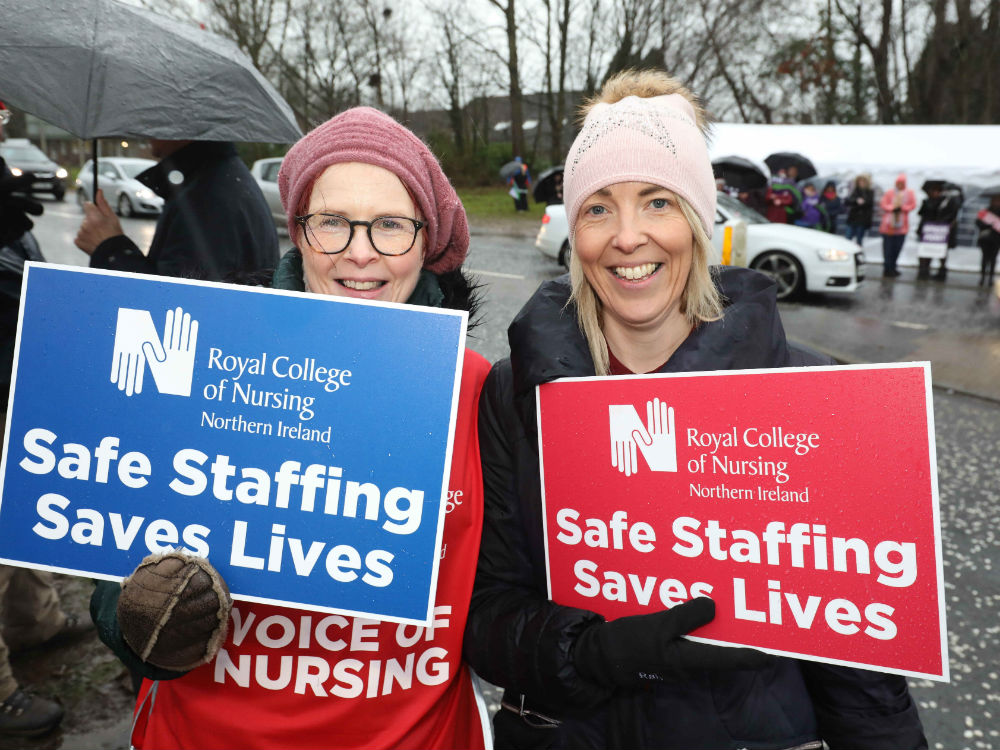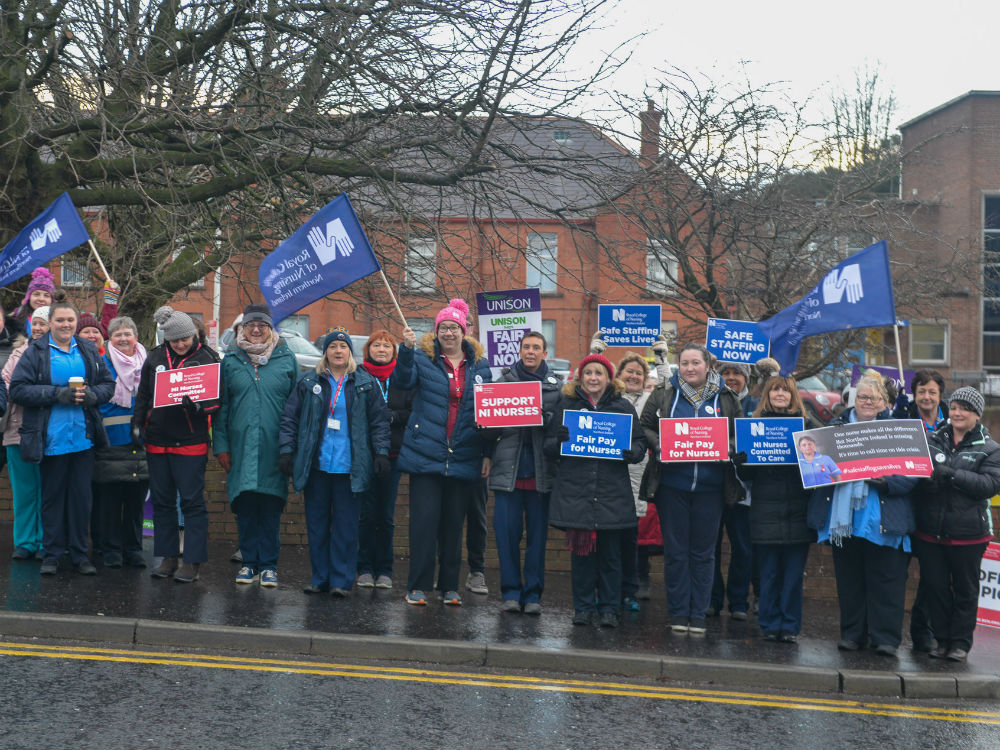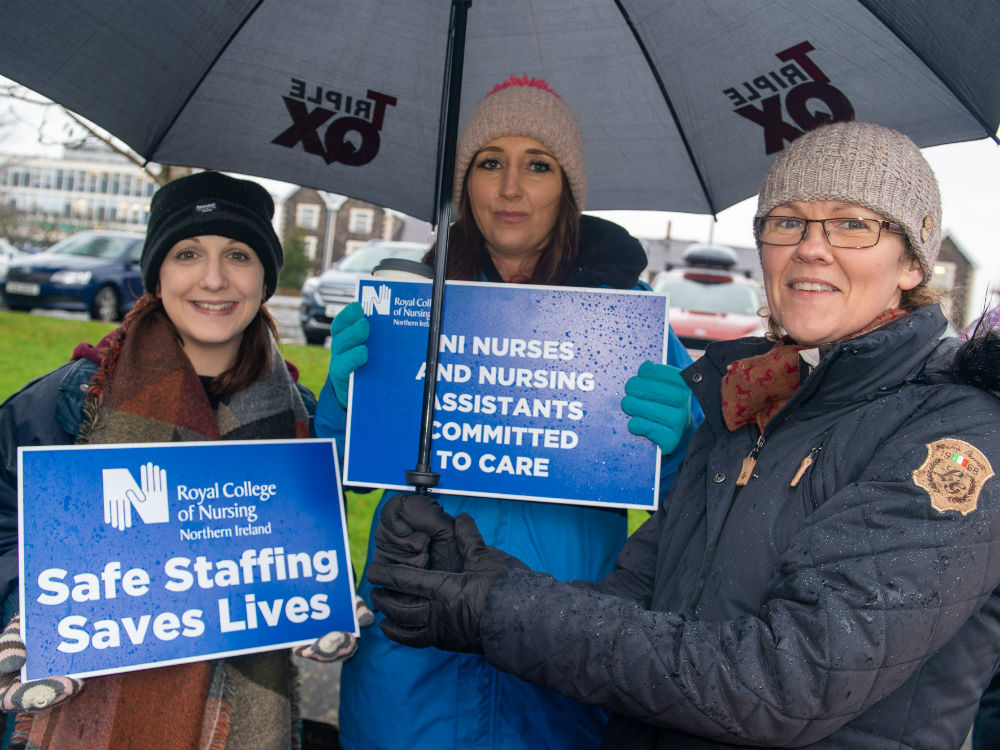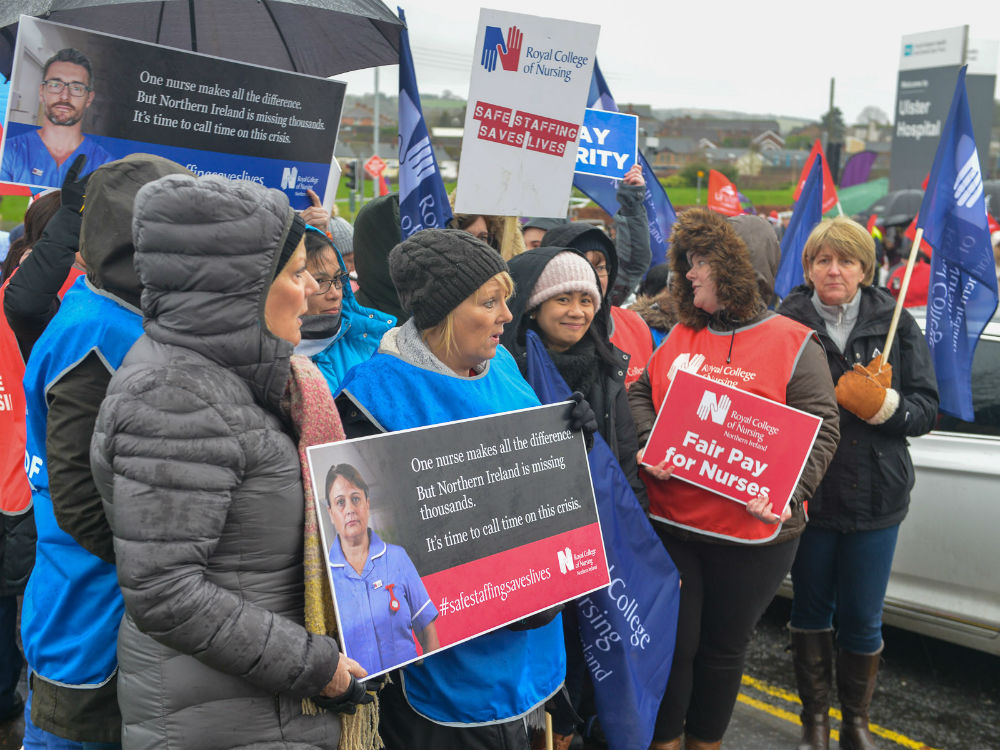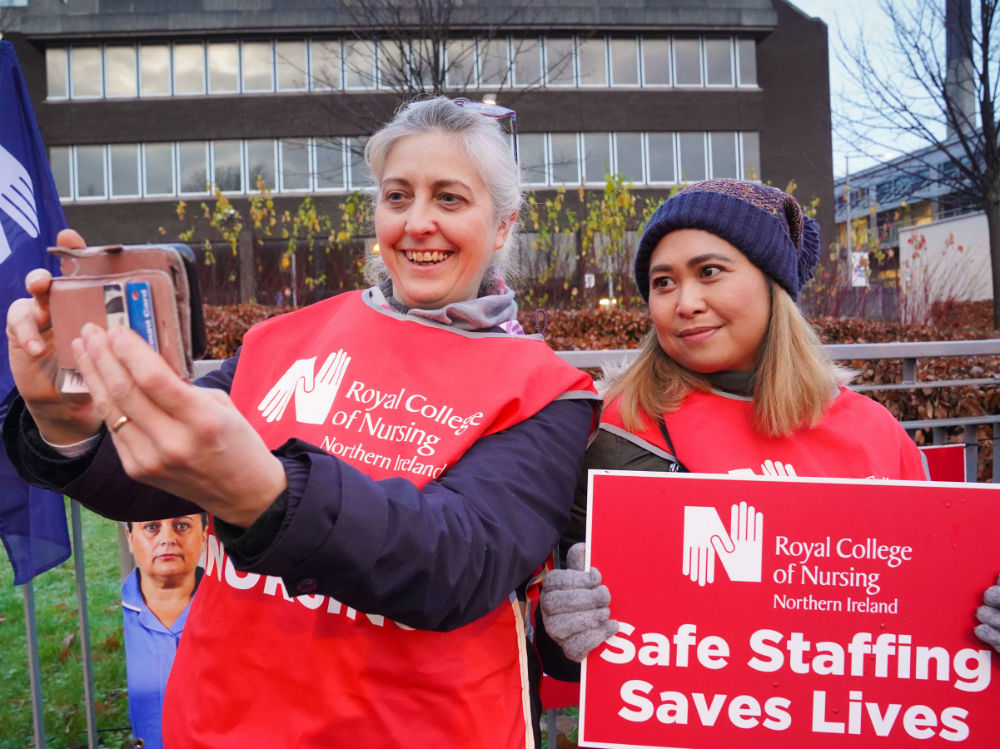For the first time in the 103-year history of the RCN, nursing staff have been on strike in Northern Ireland.
Here they reveal how tortured they feel joining picket lines, but how crucial it is that their voices are heard in the fight for safe staffing and fair pay
“As I listened to the six o’clock news on my drive to work on the day of the strike, I cried. I never thought we’d get to this point. I felt devastated, but we’ve been left with no other choice.
“Unsafe staffing levels are having such a detrimental impact on patient care and nursing staff. We feel totally disheartened and it’s getting worse. Last year we spent £52 million on agency nurses, which would have more than paid for the pay parity we’re seeking.
“I feel so proud that as a union we’ve taken this step – members gave a strong mandate for this. We know the issues we’re raising won’t be solved overnight – but there doesn’t seem to be anything happening about the concerns we’ve raised.
“We all just want to get back to work, caring for our patients.”
Lyndsay Thomson
Roisin DevlinAfter almost 30 years in nursing I have seen some of the most heart-breaking things you could imagine and cried many tears. I can honestly say this is the saddest day of my career.
“I haven’t slept, I feel sick, but we are doing this for our patients. We have to be heard - nobody’s listening to us. This has been going on for years now and I just can’t tolerate it.
“After 41 years of nursing, at the top of band 5, I’m worth £14.99 an hour. We are prepared to take further action if our voices aren’t heard. It’s just unbearable to work in these conditions.
“Please, please, politicians, listen to us as nurses. We can’t go on like this.”
Eleanor McWilliams

“It’s cold, wet and windy, but we are determined to see this to the bitter end. The public support has been amazing. It’s humbling to know how much support we have.
“Nursing staff in Northern Ireland have had enough of being treated differently from our colleagues in the rest of the UK. Ministers in Northern Ireland need to sort this mess out.”
Dennis Greer
Jill FlemingI never would have thought back in 1985, when I started nursing, that this is where I would end up, on a picket line. This really goes against our grain. We are our patients advocates. We are here fighting for patient safety. There has been huge support from patients today, and that shows us they understand that we’re doing this in their interests.
“We don’t have enough nursing staff and we’re saying enough is enough. Nurses are on their knees. I walked the wards yesterday and there were nurses crying their eyes out - not over pay but because of patient care and safety. They couldn’t give the care their patients needed.
“With safe staffing comes pay parity. We’re not paid the same as our colleagues across the rest of the UK and that has an impact on nurse vacancies here.
“We have tried for years and years to talk to the department and bring this to a close. Talking has been no use so we’re now forced to do this. It’s with a very heavy heart that nurses in Northern Ireland are standing on a picket line today.”
Fiona Devlin
So why are nurses striking?
RCN member Edel Coulter explains…
“The first - and for most nurses the most important - reason is the need to promote safe nurse staffing. We have around 2,800 unfilled nursing posts in our health and social care system, with many more in our nursing homes. This means that for every eight nurses who should be caring for patients, one is missing.
“This is something I've experienced time and time again as a nurse, but one particular shift sticks out in my mind. I was working a 12-hour night shift caring for a ward of 19 patients who had had transplants. Short-staffed with just one other nurse, it was our job to keep them stable and spot signs for sepsis.
“During the night, five patient's temperatures started to peak and we knew we had to get blood and medication to them quickly. Sepsis can be fatal within hours. We had to keep bleeping for assistance as it was impossible to care for all five people between the two of us. I felt so responsible for those people's lives, that shift left my colleague and I traumatised.
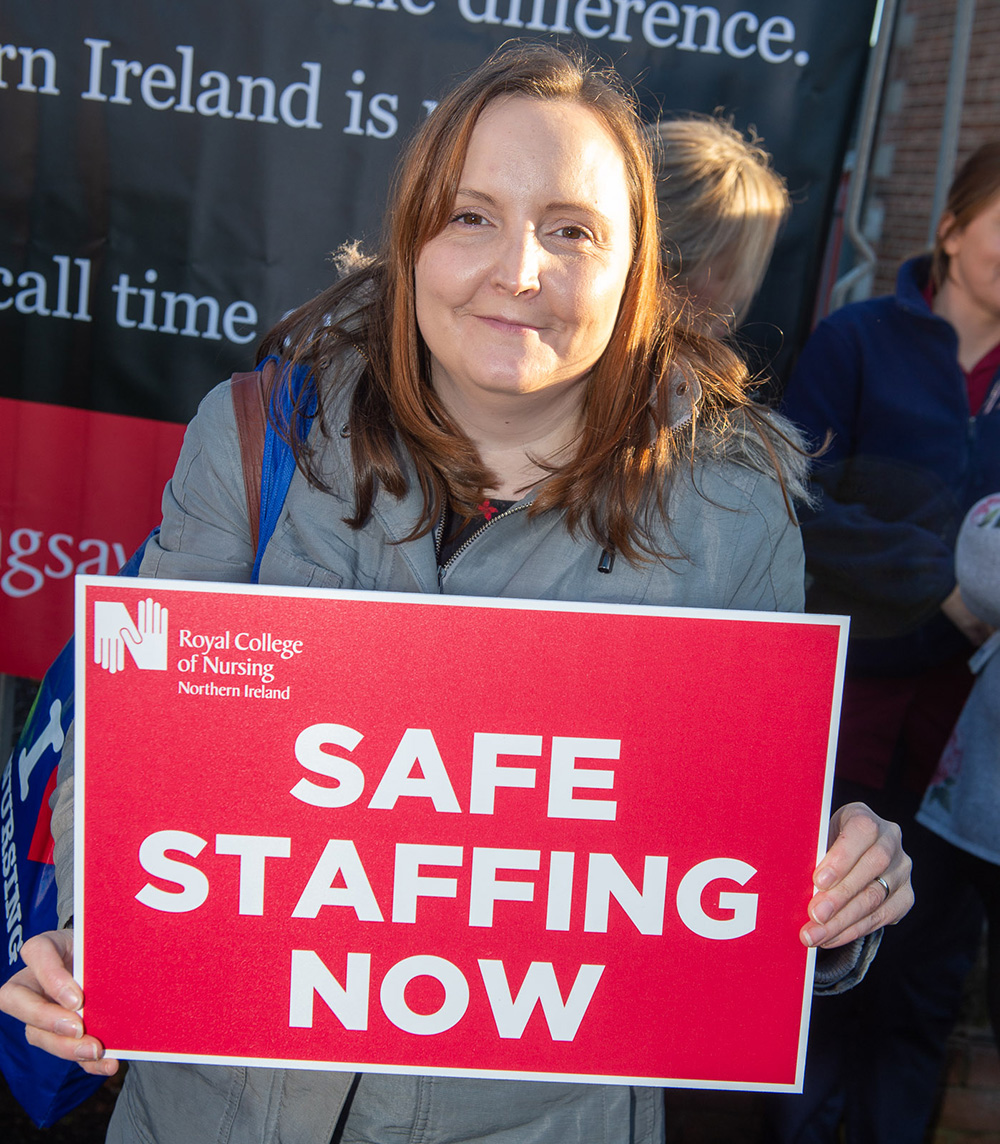
“The cumulative effect is that care is increasingly becoming unsafe. If something is not done now there will be a major incident and lives lost. Almost three-quarters of nurses in Northern Ireland work beyond their contracted hours each week. Around half do so unpaid.
“Twelve hour shifts routinely become 14 or 15 hour shifts as we struggle to cope with the volume of patients and the paperwork that is required. Most nurses feel that the single most demotivating factor is the inability to provide the level of care that they are trained to provide, want to provide, and that they know patients are entitled to receive.
“To fill the gaps in our nursing workforce, trusts spend ever-increasing sums of money on agency staff - £52 million last year - instead of undertaking proper workforce planning to ensure we train and retain the nurses we need here in Northern Ireland.
“The other key factor is pay. No nurse enters the profession for financial reasons. But we are entitled to be paid fairly and in line with our responsibilities. Yet a newly qualified nurse in Northern Ireland currently earns around £2,000 less each year than in Scotland, and around £1,500 less than in England and Wales. For specialist nurses, the pay gap can be anything up to £5,000. Not only is this unfair but it is having a devastating impact on recruitment and retention.
“Nurses are voting with their feet, leaving Northern Ireland in search of better pay and, often, better working conditions elsewhere in the UK, in the Republic of Ireland and even overseas. The pay gap makes it very difficult to attract nurses from elsewhere to come and work in Northern Ireland.
“Nurses are demanding effective measures to promote safe staffing and pay parity with our colleagues in England and Wales. We have been warning for years that, unless these issues are addressed, the health service here will fall into crisis. We are now living through this crisis and it shows no signs of easing.
"We need our politicians to realise that the crisis in the health and social care system is the greatest challenge facing the people of Northern Ireland and take decisive action to address it.”
See more pictures from the picket lines...
Want to find out more?
See the latest information about our campaign for safe staffing and pay parity in Northern Ireland.
Sign our petition to show support for nursing staff in Northern Ireland.




